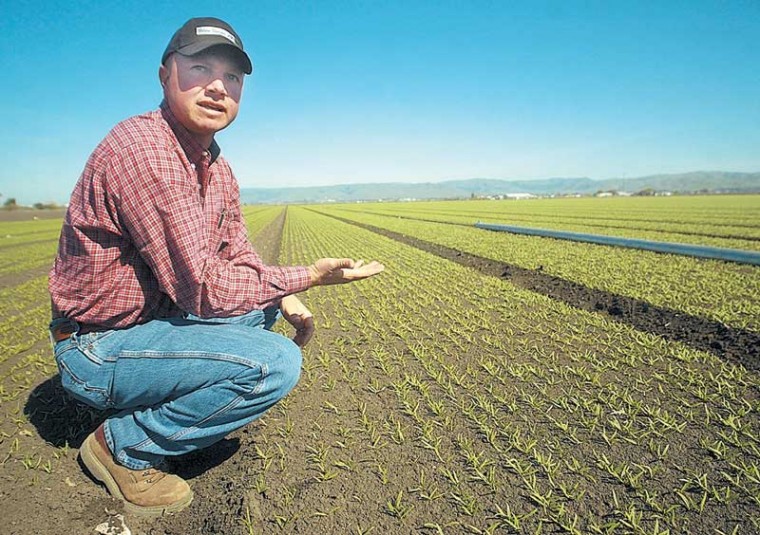
Hollister
– As the growing season in the desert of Arizona fades, spinach
fields are slowly but sparsely returning to San Benito County with
the onset of spring.
Hollister – As the growing season in the desert of Arizona fades, spinach fields are slowly but sparsely returning to San Benito County with the onset of spring.
Decreased demand and increased food safety concerns have delayed planting and restricted the county’s spinach crop acreage six months after an E. coli outbreak linked to spinach killed three and sickened 204 across the country. For many local growers, calculating demand, planning their crop rotation and planting spinach is a high-wire act.
Mark Wright, grower for Hollister-based Filice Farms, is no exception.
“Compared to where we were a year ago, we’re way behind,” Wright said.
In fact, Wright said Filice Farms has cut spinach planting by 74 percent.
Richard Silva, vice president of the San Benito County Farm Bureau and grower for Top Flavor Farms, was sowing millions of spinach seeds over eight acres in a field south of Fallon Road for Wright and Filice Farms.
“If anything, this whole ordeal that we’ve gone through has pulled the growers closer together,” Wright said.
With a boom in the pre-washed, prepackaged salad industry and the proximity of San Juan Bautista-based Natural Selection, county spinach production has tripled since 2001, using more than 3,500 acres in 2005. That year, revenue from spinach grown in San Benito County exceeded $14 million.
However, last year’s revenue may be down significantly from previous years.
San Benito County Agricultural Commissioner Paul Matulich estimated county spinach revenue loss last year was between $5 million and $6 million due to the E. coli outbreak.
Consumer confidence and demand for the crop to fill prepackaged salad bags has yet to fully rebound after the outbreak. And leaving fields void of spinach not only hurts growers’ bottom line, but it also creates soil quality issues.
“We can’t just grow the same crops on this ground year after year,” Wright said. “We have to rotate different commodities.”
Without the ability to rotate, soils can become susceptible to disease, Wright said. For many row crop growers in San Benito County, spinach is an important rotation crop.
Two weeks ago, Wright began planting his blocks of spinach. The block he and Silva were planting Thursday morning is surrounded by other fields, creating a natural buffer to any possible bacteria.
“We’re looking at our surroundings here and asking, ‘What are our potential problems?'” Wright said.
Wright said growers are considering what wildlife or livestock is in the area and planting accordingly. Growers are receiving pressure from shippers who take the spinach directly from the field, he said.
“The shipper is almost dictating as to where they want their crops planted,” Wright said.
Natural Selection Foods, which was linked to the outbreak, has implemented testing at almost every level of leafy green production, including testing irrigation water, seeds and soil at the farm level.
Silva said he has always tested his water and has never had a problem where he grows in the San Juan Valley and Hollister.
“The water tests have been stringent in the past and they’re more stringent now,” Silva said.
San Benito County growers are also feeling pressure from the public eye.
Traces of the deadly E. coli O157:H7 outbreak strain in the September outbreak were found on Paicines Ranch near land leased to Mission Organics, a spinach grower, according to a report released last week by the California Department of Health Services and the United States Food and Drug Administration.
The final report did not find how the spinach was contaminated, but suggested several ways in which the E. coli could have spread.
Officials found E. coli from pig feces, cattle feces and river water on Paicines ranch, state health officials said, but did not know if the tainted spinach was grown by Mission Organics.
Although investigators may never find the exact cause of the outbreak, county growers will continue to work on safety practices, adapt to consumer demand, and plant and harvest spinach through October.
And Silva is confident that the industry will continue to do everything in its power to keep its products safe.
“If we put it out on the store shelves, it’s a good product,” Silva said. “I don’t think people have to be afraid of it.”
Michael Van Cassell covers public safety for the Free Lance. He can be reached at 831-637-5566 ext. 335 or mv*********@***********ws.com.









